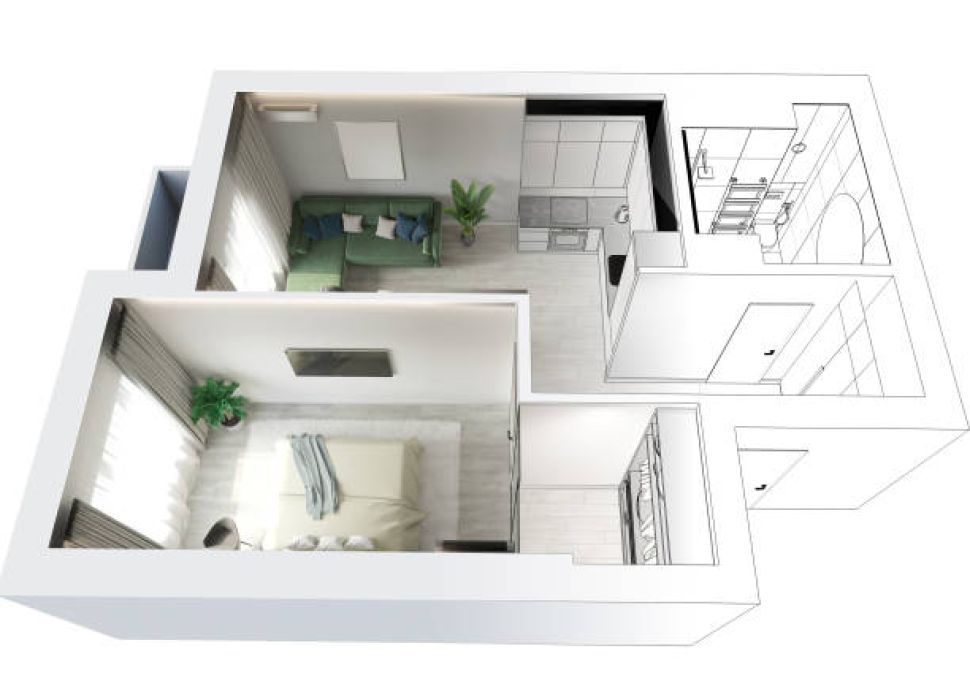
-
by House explorer
Comments
How Micro-Apartments Are Solving Urban Space Constraints in Nigeria
In Nigeria’s bustling cities like Lagos, micro-apartments are emerging as clever solutions for young professionals craving affordable homes in tight spaces. These compact, efficient dwellings are transforming urban housing, offering style and functionality without the hefty price tag. This blog explores how micro-apartments address urban space constraints in 2025, reshaping Nigeria’s real estate market. Join us to uncover this innovative trend revolutionising city living!
What Are Micro-Apartments?
Micro-apartments are small homes, typically 15-30 square metres, designed to maximise space with smart layouts and built-in furniture. In Nigeria, they cater to singles or young couples in urban hubs like Abuja. They include essentials like kitchens and bathrooms in compact designs. These homes are perfect for space-scarce cities.
Why Micro-Apartments Are Rising
Nigeria’s urban areas face a 20-million-home shortage, making micro-apartments a timely fix for urban space constraints. High rents and limited land push developers to build smaller units in cities like Port Harcourt. In 2025, demand for affordable housing fuels their growth. Micro-apartments offer a practical solution for urban dwellers.
Space-Saving Designs
They use clever features like foldable beds, wall storage, and multi-use furniture to maximise space. In Nigeria, these designs turn 20 square metres into functional homes in areas like Lekki. Residents enjoy comfort without clutter in 2025. Smart layouts redefine urban housing efficiency.
Nigeria’s Real Estate Shift
Nigeria’s real estate market is embracing micro-apartments to address urban density, with developers building high-rise units in cities like Enugu. These homes fit more people into less land, easing urban space constraints. In 2025, they’re a top choice for developers. This shift transforms Nigeria’s city landscapes.
Appealing to Young Professionals
Micro-apartments attract Nigeria’s tech-savvy youth, like coders in Yaba, who value location over size. These homes are near workplaces and nightlife, perfect for 20-35-year-olds in 2025. They offer convenience and style on a budget. Young Nigerians drive the micro-apartment boom.
Sustainable Urban Living
They promote eco-friendly living by using less energy and materials, cutting utility bills by 20%. In Nigeria, solar panels and LED lights are common in these units in 2025. They reduce strain on urban resources. Green designs make them a win for cities.
Affordability for City Residents
These apartments costs 30-50% less than standard flats, with Lagos units renting for ₦50,000-₦100,000 monthly. This affordability attracts young professionals and students in 2025. Lower costs mean more savings for other goals. They make city living accessible in Nigeria’s pricey markets.
Community and Connection
They often include shared spaces like co-working areas or lounges, fostering community in Nigeria’s urban hubs. Residents in Abuja share events, building networks in 2025. This combats city loneliness effectively. Social vibes enhance the appeal of urban housing.
Challenges of Small Spaces
Living in micro-apartments can feel cramped, especially for Nigerians used to larger homes, with storage issues arising. Noise from close quarters in Lagos units can also bother residents in 2025. Good design and rules help. Buyers must weigh space versus affordability.
Tech-Enhanced Living
Micro-apartments in Nigeria integrate smart tech, like app-controlled lights or security, for ease. In 2025, young residents in Ibadan love these modern touches. Tech maximises small spaces efficiently. It’s a big draw for tech-savvy renters.
Investment Opportunities
These apartments yield 8-12% returns in Nigeria’s real estate, with high demand in cities like Kano. Investors see steady rentals from young professionals in 2025. Their low build costs boost profits. They’re a smart bet for real estate portfolios.
Cultural Fit in Nigeria
Micro-apartments suit Nigeria’s urban youth culture, offering spaces for solo living or small gatherings. In 2025, they align with fast-paced lifestyles in cities like Calabar. Designs with local art add charm. They resonate with Nigeria’s modern vibe.
Regulatory Hurdles
Nigeria’s zoning laws, like in Lagos, may limit micro-apartment high-rises, requiring permits. Non-compliance risks fines, affecting developers in 2025. Clear rules are needed for growth. Legal checks ensure smooth project launches.
Flexibility for Renters
Micro-apartments offer short-term leases, ideal for Nigeria’s mobile workforce, like tech nomads in Uyo. Monthly contracts suit transient lifestyles in 2025. Renters enjoy freedom without long commitments. This flexibility boosts micro-apartment popularity.
Urban Planning Benefits
They ease urban space constraints by housing more people in less land, reducing sprawl in Nigeria’s cities. In 2025, they help Lagos manage population growth efficiently. They support sustainable city expansion. This makes urban planning smarter.
Maintenance and Upkeep
Micro-apartments require less maintenance than larger homes, saving owners money in Nigeria. In 2025, simple repairs in Owerri units keep costs low. Tenants enjoy hassle-free living. Low upkeep adds to their appeal.
Future of Micro-Apartments
In 2025, micro-apartments will grow in Nigeria’s real estate, with smarter designs and eco-features. Secondary cities like Jos will see new projects as urban demand rises. They’re a bold fix for urban space constraints. Micro-apartments are set to shape city living.
Tips for Residents
Considering a micro-apartment? Visit units in Nigeria’s urban hubs, check amenities, and test layouts. Opt for short leases to try living small in 2025. Choose locations near work for convenience. Start your micro-living journey with confidence.
Are They the Future?
Micro-apartments tackle urban space constraints in Nigeria, but their small size may not suit families. They’re ideal for young, single urbanites in 2025. They’ll shape urban housing, not replace it. Their rise is a game-changer for cities.
Conclusion
Micro-apartments are revolutionising Nigeria’s urban housing, offering affordable, smart solutions to urban space constraints in 2025. With clever designs and community vibes, they’re perfect for city dwellers. Ready to embrace small living? Visit House Explorer for listings and tips to start your micro-apartment adventure!
Posted 5 months ago
Add a comment